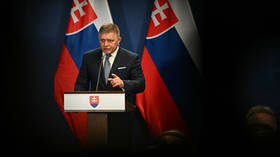
If disagreement with political choices leads to an assassination attempt on a prime minister, it means sustainable democracy has not been built
By Timofey Bordachev, Program Director of the Valdai Club

A general view of the F. D. Roosevelt University Hospital where Slovakia’s Prime Minister Robert Fico is undergoing operation in Banska Bystrica, Slovakia on May 15, 2024. © Robert Nemeti / Anadolu via Getty Images
The assassination attempt on Slovak Prime Minister Robert Fico is further proof the fragility of political regimes in Eastern Europe.
This is not because there is a “tradition” of political killings there. They have happened in numerous places in recent decades – from prosperous Sweden to clan-divided Serbia. Indeed, US presidents have been assassinated, while in Italy, Prime Minister Aldo Moro fell victim to terrorists 50 years ago. Each of these tragedies was the product of particular circumstances and had little impact on the general course of history. The problem in Eastern Europe is that an attack on a statesman can lead to a serious domestic, or even international, crisis.
This means that these countries themselves are not stable enough, and that their geopolitical positioning is little more than a battleground for powerful external forces. If economic history has the concept of “late industrialization,” then in political terms, the fate of the Eastern Europeans can be defined as “late state-building.” Whether it is possible to succeed under such conditions remains a serious question. So far, at least, there have been no convincing examples of countries overcoming the consequences of lagging behind in such a crucial area.
It is no coincidence that many observers seemed to immediately recall the assassination of Austrian Archduke Franz Ferdinand in Sarajevo in the summer of 1914, which signaled the outbreak of the First World War. This reaction is also a sign that the whole of Eastern Europe is seen in the context of its belonging to the great empires of the past. Local agency is not taken into account, because the fate of these states is not in their own hands.
In principle, an armed attack by a person on a statesman, simply because he is not satisfied with the course pursued by a party that won an election, is a significant political event. First of all, it means the failure of the main mission the West set itself after the Cold War: to stabilize the countries formerly under the influence of the USSR.
One of the stated aims of the eastward enlargement of the European Union and NATO was to support the democratic transformation of Eastern European countries and to help build functioning political systems there. And if disagreement with the choice of one’s fellow countrymen can lead to an attempt to assassinate the head of government, then it means that a stable democracy has not been built. All the more so as it was immediately suggested that other Eastern European politicians – in Poland and Hungary – also have reason to fear an attempt on their lives. And a reasonable question arises: if external control – in this case by the “old” West – has not ensured stable development, what was the point of it in the first place?

Read more
The Slovak prime minister, who is now fighting for his life, is undoubtedly an extremely decent man who is worried more about the fate of his country than his personal career. However, such a course becomes quite risky in conditions where powerful external forces see the Eastern European states only as a stepping stone to advance their global agenda. In this case, we are talking about the United States and its British allies, for whom the confrontation with Russia and China is all that matters. Everything outside of this is just judged by its usefulness in the global struggle for dominance. Policy isn’t based on the prospects for relations with partners as such, but on how these countries can be used in a game that has nothing to do with their real interests.
The result is a split between the elites and the population, for whom the future of the country depends on the whims of an external source of power. The physical expression of these whims is the activity of the Western media, which is happy to smear undesirable politicians in Eastern Europe. A British newspaper even labelled Fico a “Putin ally” on its front page.
For more than 15 years, Slovakia has hosted a major international conference funded by Brussels and the British arms lobby. Formally, everything is organized by a local NGO. The political aim of the event has traditionally been to underline the commitment of Slovaks and other Eastern Europeans to the “Atlantic choice.” The influence of these structures – which are financed by foreign interests – remains significant.
In other words, in one way or another, Western actors are simply buying the loyalty of a section of the local elite, which, when it comes to foreign policy, does not care about the wishes of the population. It is no coincidence that Georgia’s desire to adopt its own law on foreign agents is causing such anger in the West – it will make influence peddling through corruption much more difficult.
This model was adopted by the US and its closest allies after Cold War – buying loyalty with money or access to benefits available in the West. In the former Baltic republics of the USSR, this strategy was complemented by the introduction of Western-born and/or raised into the state apparatus. A similar function was fulfilled by the distribution of positions in the bureaucratic structures of the European Union and NATO among Eastern Europeans: they received them as a reward for activities on the national political scene which helped American interests.
But this is only a consequence of the general geopolitical position of Eastern European countries. Much more serious is the fact that, even without direct manipulation by the US or major Western European states, the building of sustainable statehood in Eastern Europe faces the conceptual problem of its place in the modern world.

Read more
The states of this region were born when all the great powers of international politics were already established. Even China, which experienced a century of terrible upheaval between 1837 and 1949, had already passed through it with thousands of years of experience of independent development. India, which came under foreign rule in the 18th century, had centuries of experience of history with large states on its territory. Russia, Germany, France or Britain at the beginning of the last century were empires with established political cultures and traditions. And for the relatively young United States, the lack of tradition was compensated by its careful cultivation of statehood and its isolated position as an “island” in world politics. Eastern Europe had no political culture or state tradition of its own. The turbulent events of the 20th century further prevented it from making serious progress in this direction.
What emerged after the Second World War was doomed by splits – large numbers of supporters of the Nazis or the former authorities fled to the West and carried out subversive activities from there. The end of the Cold War did nothing to heal this division. In most cases, it simply brought to power those who were categorically dissatisfied with the communist order. As a result, the countries of Eastern Europe simply moved from one sphere of influence to another, but did not change internally. They remained the same incomplete states they had been for decades.
The activities of politicians such as Robert Fico or Viktor Orban are thus a challenge not only to external control from Washington or London, but to the whole pattern of regional political life. Nationally oriented statesmen are a necessary phenomenon for Eastern Europe. But they are completely unnatural from a historical perspective. That is why their fate will always be fraught with mortal danger.
This article was first published by ’Vzglyad’ newspaper and was translated and edited by the RT team.




